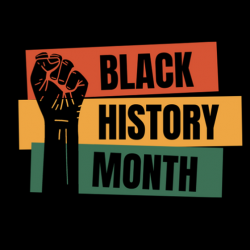

October marks Black History Month in the UK, which began in the US in the 1920s, and was first celebrated in the UK in 1987.
It allows everyone to share, celebrate and understand the impact of black heritage and culture.
Black History Month 2023
People from African and Caribbean backgrounds have been a fundamental part of British history for centuries. However, campaigners believe their contribution to society has often been overlooked or distorted.
Black History Month is also celebrated in local communities, where museums, care homes and workplaces explore a broad range of topics, from Britain's colonial past, to migration, and music.
For 2023, the theme is "Saluting Our Sisters" and the #WEMATTER movement, where people are encouraged to find out more about the exceptional achievements of black women, especially those who have had their contributions ignored, ideas appropriated, and voices silenced.
Conversations about race are important to have in the workplace because it supports an organisation's anti-racism work, and encourages a two-way dialogue and conversation about race.
This is important for building relationships, rapport, and trust among colleagues.
Black History Month in the workplace
Race is one of the nine "protected characteristics" covered by the Equality Act 2010.
Race discrimination:
At work, the law protects the following people against discrimination:
Someone could experience racial discrimination from anyone they come into contact with because of their job, including other people at work, customers, and members of the public.
Race discrimination includes:
If someone has experienced or witnessed racial discrimination at work, they can make a complaint to their employer. The employer should take it seriously and look into it as soon as possible.
Employers should make sure that:
If you are an employer or manager, you should look into any discrimination complaint in a way that is fair and sensitive to:
Steps for preventing race discrimination in the workplace
All employers should take steps to try to make sure racial discrimination does not happen at work. As an employer, you should:
Measures that are specific to preventing race discrimination include:
Things to do for Black History Month
Celebrating Black History Month and supporting black colleagues is extremely important. If you are searching for things to do for Black History Month at work, Inclusive Employers have provided a few suggestions:
Beyond Black History Month
This discussion and learning should not just be for the month of October. Instead, the focus should be on integrating Black History into mainstream education, news and culture.
There is a growing consensus that we cannot rely on Black History Month alone to address systemic issues of racism, nor can we rely solely on what is taught in schools.
We all need to be conscious of the positive achievements and contributions of black people in our countries as well as the relevant colonial history. We need to take individual responsibility for our education, and levels of awareness and reflection.